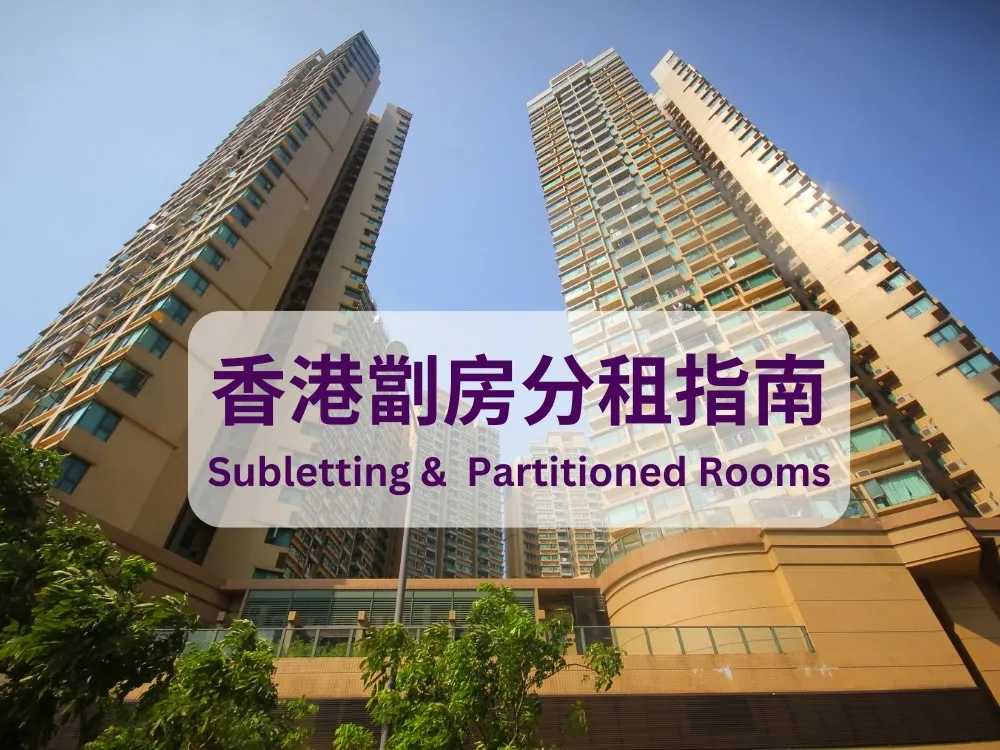HK Partitioned Rooms: Compliance, Penalties, Tenant Rights
Listen to the blog audio:
In Hong Kong, subletting and partitioned rooms are often more cost-effective housing options, attracting students, working professionals, and new immigrants who seek to reduce their housing costs through shared rentals. Despite their affordability, these housing options come with a host of potential legal and safety issues. This article provides a comprehensive guide to help tenants protect their rights when choosing to sublet or rent partitioned rooms.
Definitions and Basic Concepts of Subletting

Subletting typically refers to tenants who do not rent an entire property directly from the property owner but rather rent one or several rooms within the property. In Hong Kong, there are two common forms of subletting:
- Direct Subletting: Tenants sign a lease directly with the landlord to rent part of the property, with other rooms possibly rented to other tenants.
- Indirect Subletting: A tenant, often referred to as a "sub-landlord," rents the entire unit and then sublets individual rooms to other people. In this scenario, the original tenant takes on the roles of managing and subletting.
Definition and Legality of Partitioned Rooms
In Hong Kong, a partitioned room refers to the division of a single, originally complete room into multiple smaller rooms for rent. According to the Housing Authority, partitioned rooms involve "dividing a legal residential unit into multiple rooms, renting out each room individually."
Partitioned rooms are a significant social issue in Hong Kong. Estimates from the Housing Authority suggest that as of 2023, there are approximately 120,000 partitioned rooms, housing over 300,000 people.
Requirements for Legal Partitioned Rooms
- Building and Planning Requirements: Modifications to create partitioned rooms must comply with the Buildings Ordinance, including adequate ventilation, lighting, and safe exits.
- Essential Living Facilities: Each partitioned unit must have basic amenities, such as a private bathroom and kitchen.
- Government Approval: Modifications need approval from the Buildings Department to ensure compliance with all building and fire safety standards. Landlords must apply for and obtain a renovation permit, securing consent from relevant authorities before making any structural changes.
Risks and Legal Consequences of Illegal Partitioned Rooms
- Overcharging for Utilities: One common issue with illegal partitioned rooms is landlords overcharging for utilities, as these rooms often lack independent meters, leading to tenants paying significantly more than standard rates, which can financially strain lower-income renters.
- Illegal Conversions in Industrial Buildings: Some landlords illegally convert industrial buildings into partitioned rooms for rent, which violates building usage regulations. Tenants in these illegal setups face risks of eviction and may not receive legal protection or compensation in disputes. The Buildings Department also enforces laws, demanding the removal of illegal structures.

Legal Penalties for Illegal Partitioned Rooms in Hong Kong
- According to the Buildings Ordinance, unauthorized constructions on property rooftops without approval from the Buildings Department can lead to fines up to HK$5 million and imprisonment for 18 months.
- Under the "Partitioned Rooms Rental Ordinance": Landlords who demand or collect unapproved fees such as specified rent, deposits, utility, and service charges, or damages for breach of contract are acting illegally. Penalties for first-time offenses can reach a level 3 fine (HK$10,000), with subsequent offenses possibly incurring a level 4 fine (HK$25,000).
- As per the "Water Services Regulation," landlords who overcharge for water also violate the law, with penalties up to HK$10,000.
Precautions Before Signing a Sublet or Partitioned Room Lease
- Safety and Compliance Checks: Verify the overall safety of the building and the rental unit, including structural integrity and fire safety provisions like smoke detectors and fire extinguishers.
- Sanitary Conditions: Maintain good hygiene in partitioned or sublet units to prevent health issues due to cramped and enclosed spaces.
- Rent and Additional Charges: Clearly understand what is included in the rent, such as management fees, utilities, and internet charges.
- Lease Terms: Important lease provisions should specify the rental period, conditions for renewal, the amount and terms for deposit refunds, and procedures and costs associated with early termination of the lease.
Tenant Rights and Protection Measures
In Hong Kong, tenant rights are protected under laws like the "Comprehensive Landlord and Tenant Ordinance." It is crucial for tenants to be aware of their rights:
- Legal Protection: Tenants are entitled to proper living conditions, and landlords must ensure the rented premises meet legal living standards.
- Uninterrupted Living: Tenants have the right to undisturbed use of their units, with landlords requiring permission to enter.
Dealing with Rental Disputes
- Tenants can take legal action through the Tenancy Tribunal to resolve disputes with landlords.
- It is advisable for tenants to keep all documents and communications related to the lease as potential evidence.
Reporting Illegal Partitioned Rooms
- Tenants who discover violations of the Buildings Ordinance can demand corrective actions from landlords.
- If an agreement with the landlord is not possible, tenants can report to the Buildings Department by calling 2626 1616 (transferred to '1823').

Sublet Agreement and Subdivided Flat Tenancy Agreement
When subletting a property in Hong Kong or other regions, the lease agreement is a crucial document that governs the rights and responsibilities of the tenant and the landlord (or sub-landlord). Understanding the various clauses in a sample lease agreement is essential for protecting your rights.
- Lease Agreement Sample: A sample lease agreement should clearly list the basic information of the tenancy, including the address of the property, the lease term, the monthly rent, and any additional fees included (such as management fees, utilities, etc.). Additionally, the sample will specify the date and method of rent payment, as well as any rent adjustment clauses.
- Lease Terms: The lease will detail the obligations of both the tenant and the landlord. This includes the scope of facilities the landlord must maintain, the tenant's usage restrictions, the permitted extent of modifications, and how breaches of contract will be handled. Particularly important, the lease should detail the tenant's rights during the tenancy, such as access to and use of specific parts of the property (e.g., kitchen and bathroom).
- Subdivided Flat Tenancy Agreement: In subletting situations, a sub-landlord is common with no direct involvement from the landlord. The sub-landlord should provide a sublet agreement based on the main lease agreement. This sublet agreement should clearly specify the tenant's usage rights and rental term, along with the specific terms of the sublet. To avoid future disputes, tenants should request to see a copy of the main lease agreement to ensure the sub-landlord has the legal right to sublet.
FAQ About Subletting and Subdivided Flats in Hong Kong
Do I Need to Pay Tax on Subletting an Apartment?
In Hong Kong, rental income from subletting is taxable. Landlords must declare this income and pay property tax, although taxes are allowed to deduct expenses such as property depreciation, repair costs, taxes, insurance, management fees, and mortgage interest.
Can Tenants in Subdivided Flats Apply for Public Housing?
Yes, tenants of subdivided flats are eligible for public housing in Hong Kong.
Eligibility Requirements:
- Applicants must be Hong Kong residents with a valid identity card.
- Their family income and assets must not exceed the public housing thresholds.
- They must lack adequate living conditions.
Application Process:
- Obtain an application from the Housing Department’s offices.
- Complete and submit the form with necessary documents.
- The Housing Department evaluates eligibility and adds qualified applicants to the public housing waiting list.
Can Sub-Landlords Increase Rent At Any Time?
No, in Hong Kong, rent cannot be increased arbitrarily during the lease period as per the Landlord and Tenant Ordinance. Rent changes must adhere to the terms specified in the lease agreement.






-10%202.webp?locale=en)
-8%202.webp?locale=en)
-7%202.webp?locale=en)
-9.webp?locale=en)